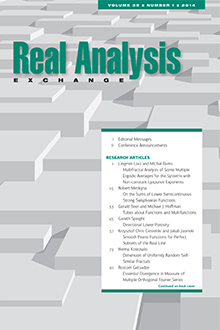Abstract
In this paper the following question is investigated. Given a natural number \(r\) and numbers \(\alpha_j,\beta_j\) for \(j=0,1,\dots,r\) satisfying \( \alpha_0 <\alpha_1 < \dots \lt \alpha_r \) and \begin{equation*} \sum_{j=0}^{r} \beta_j \alpha_j^k= \begin{cases} 0 & \text{if \(k=0,1,\dots,r-1\)}\\ r!& \text{if \(k=r\) } \end{cases} , \end{equation*} is there a \( 2\pi\)-periodic, \( r-1\) times continuously differentiable function \( f\) such that \begin{equation*} \limsup_{h \nearrow 0} h^{-r} \Big(\sum_{j=0}^{r} \beta_j f(x+ \alpha_j h)\Big) = \limsup_{h \searrow 0} h^{-r} \Big(\sum_{j=0}^{r} \beta_j f(x+ \alpha_j h)\Big) = \infty, \end{equation*} \begin{equation*} \liminf_{h \nearrow 0} h^{-r} \Big(\sum_{j=0}^{r} \beta_j f(x+ \alpha_j h)\Big) = \liminf_{h \searrow 0} h^{-r} \Big(\sum_{j=0}^{r} \beta_j f(x+ \alpha_j h)\Big) = - \infty \end{equation*} for every \( x \in \mathbb{R} \)?
Citation
John C. Georgiou. "Extreme Results on Certain Generalized Riemann Derivatives." Real Anal. Exchange 40 (1) 193 - 208, 2013/2014.
Information





